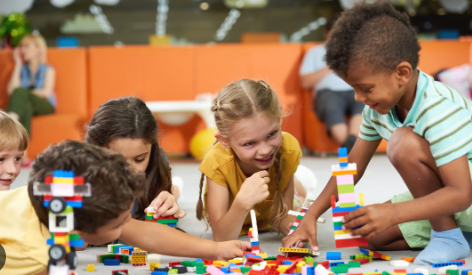
Play is not just about fun and games, it’s a fundamental part of child development. Through play, children learn to explore their world, build essential skills, and nurture their creativity and imagination. Understanding the role of play in child development is crucial for parents, educators, and caregivers. Let’s dive deeper into why play is so important and how it can shape a child’s growth and learning journey.
1. Play Builds Cognitive Skills
Children develop cognitive skills, such as thinking, problem-solving, and decision-making, through play. Whether it’s assembling a puzzle, building a tower with blocks, or engaging in a pretend-play scenario, these activities require kids to plan, strategize, and think critically. Play stimulates brain development and strengthens neural connections, which are essential for learning and memory.
2. Enhances Language and Communication Skills
Play is a natural way for children to learn language and communication. When children play with others, they practice using new words, express their thoughts, and listen to others. Activities like storytelling, role-playing, or engaging in pretend play encourage kids to articulate their ideas, expand their vocabulary, and improve their ability to understand and convey messages.
3. Boosts Social and Emotional Development
Play is vital for developing social and emotional skills. It teaches children how to interact with peers, share, negotiate, and resolve conflicts. Through cooperative play, children learn empathy, patience, and understanding. They also discover how to manage emotions, cope with frustration, and build self-confidence. Social play, in particular, provides opportunities to practice these skills in a safe and supportive environment.
4. Fosters Creativity and Imagination
Creative play is a powerful tool for fostering imagination. Whether it’s drawing, painting, building a fort, or creating a new game, these activities allow children to think outside the box and explore different ideas. Creative play encourages innovative thinking, helps in developing problem-solving abilities, and nurtures a child’s capacity to think abstractly.
5. Promotes Physical Development
Physical play is essential for developing gross and fine motor skills. Activities like running, jumping, climbing, or playing sports enhance coordination, balance, and physical strength. Even simple actions like stacking blocks or threading beads improve hand-eye coordination and dexterity. Regular physical activity through play is also crucial for maintaining a healthy weight and overall well-being.
6. Encourages Independence and Decision-Making
Play gives children the freedom to make choices and decisions. When they choose a game to play, select roles in a pretend scenario, or decide how to build a structure, they are practicing decision-making skills. This fosters independence and confidence, helping children learn to trust their judgment and become self-reliant.
7. Supports Emotional Resilience
Through play, children learn to cope with challenges and setbacks. Whether it’s figuring out how to complete a challenging puzzle or losing a game, play teaches resilience. Children learn that it’s okay to fail and try again, fostering a growth mindset that is essential for future learning and success.
8. Enhances Attention and Focus
Play can help improve a child’s attention span and concentration. Activities that require sustained effort, such as board games, building projects, or arts and crafts, teach kids to focus on a task for an extended period. This skill is essential for academic success and other areas of life.
9. Encourages Exploration and Curiosity
Play allows children to explore their surroundings and satisfy their curiosity. It encourages them to ask questions, experiment with ideas, and seek answers. This natural curiosity nurtured through play is a critical component of lifelong learning and intellectual growth.
10. Builds Stronger Family Bonds
Play is not just beneficial for children but also strengthens family relationships. Engaging in playtime with your child fosters connection and builds trust. Whether it’s a game night, storytelling, or outdoor activities, these moments create cherished memories and deepen the parent-child bond.
Conclusion
Play is a powerful tool that supports every aspect of a child’s development, from cognitive growth to social skills, creativity, and emotional resilience. Parents and caregivers can help children thrive in all areas of life by providing ample opportunities for both structured and unstructured play
Ready to learn more about the benefits of play and how you can incorporate it into your child’s routine? Subscribe to our blog for more tips, resources, and activities designed to support your child’s growth and development!









Build your child’s cognitive skills by engaging them in games